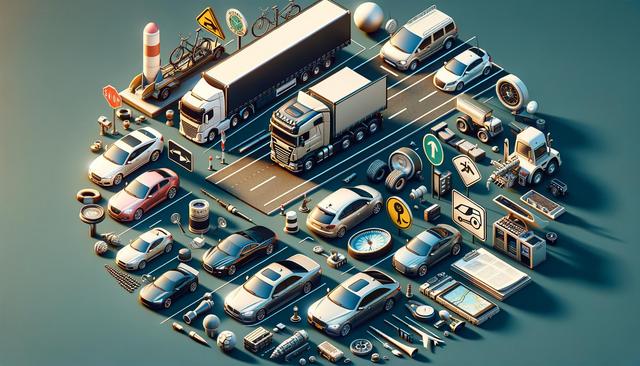Understanding the Role of a Car Transport Diver
Car transport divers are an essential part of the automotive logistics chain. Their primary responsibility is to move vehicles safely and on time, often from manufacturing facilities to dealerships, auction sites, or clients’ homes. This role requires more than just driving skills; it demands attention to detail, strong organizational abilities, and adherence to safety protocols. Divers must also be able to handle different types of vehicles, including sedans, trucks, and sometimes luxury or specialty models, all of which may have unique handling requirements.
The job may involve both short and long-haul assignments, depending on the employer’s needs. As a result, divers often work flexible schedules and must be comfortable with varying routes and weather conditions. Key components of the role include:
- Performing pre- and post-trip inspections of vehicles
- Documenting vehicle condition and delivery details
- Securing vehicles properly for transport
- Communicating with dispatchers and clients
Given the diversity of tasks, the position is well-suited for individuals who enjoy driving, are detail-oriented, and can manage time effectively while maintaining high safety standards.
Qualifications and Skills Needed for Success
To pursue a career in car transportation, divers typically need a valid driver’s license and a clean driving record. Depending on the type of transport—such as open or enclosed trailers—they may also require a commercial driver’s license (CDL). In addition, employers often look for candidates with previous driving or logistics experience, although some companies provide on-the-job training for entry-level applicants.
Successful divers in this industry often possess the following skills:
- Excellent driving and navigation abilities
- Strong communication and customer service skills
- Ability to work independently and solve problems on the road
- Physical capability to load and unload vehicles when necessary
While formal education beyond high school is not usually required, certifications or training in vehicle handling, logistics, or safety standards can enhance job prospects and support career growth. Employers also value reliability, punctuality, and a professional demeanor, as these qualities directly impact client satisfaction and business reputation.
Types of Car Transportation Jobs Available
The car transportation industry offers a wide range of job opportunities suited to different preferences and experience levels. Roles can vary significantly depending on the mode of transport and the nature of the business. Common job types include:
- Local vehicle delivery divers for dealerships or rental agencies
- Long-distance auto haulers transporting cars across states
- Fleet divers moving multiple vehicles for commercial clients
- Specialty vehicle transporters handling high-value or custom vehicles
Each role comes with its own set of responsibilities and work environments. For example, local divers may enjoy a more predictable schedule with daily home returns, while long-distance divers often spend extended periods on the road. Additionally, some divers work as independent contractors, offering greater flexibility but requiring more self-management and business acumen.
Choosing the right job depends on an individual’s lifestyle preferences, desired income level, and willingness to travel. The sector’s diversity allows for both full-time and part-time opportunities, making it accessible for people at different stages of their careers.
Benefits and Challenges in the Field
Car transportation jobs can offer several appealing benefits, particularly for those who enjoy being on the road and working independently. Some of the key advantages include:
- Opportunities for travel and seeing new places
- Flexible work schedules in many cases
- Potential for competitive pay, especially with experience
- Low barrier to entry for many positions
However, the job also comes with its share of challenges. Long hours, time away from home, and the physical demands of loading and unloading vehicles can be taxing. Navigating traffic, weather conditions, and mechanical issues also requires resilience and adaptability. Safety is a top priority in this field, and divers must consistently follow protocols to protect themselves, the vehicles, and others on the road.
Despite these challenges, many divers find the work fulfilling and appreciate the autonomy and variety it offers. Employers that invest in training, support, and equipment can make a significant difference in job satisfaction and performance.
Getting Started in Car Transportation
For those interested in exploring opportunities in this growing industry, the first step is to assess personal suitability for the role. Individuals should evaluate their comfort with driving long distances, working independently, and managing logistics-related tasks. From there, researching companies that align with one’s goals—whether local or national—is essential.
Many employers post job openings online, and industry-specific job boards can be valuable resources. Networking with current professionals or attending logistics and transportation events may also open doors. When applying, it’s important to present a clear driving history, any relevant certifications, and a professional attitude during interviews.
Some steps to begin a career in car transportation include:
- Obtaining a valid driver’s license or CDL if required
- Completing any necessary safety or logistics training
- Building a resume that highlights driving experience and reliability
- Applying to reputable transportation companies or contracting opportunities
With demand for divers on the rise, individuals entering the field now may find strong opportunities for growth and long-term stability.
Conclusion: A Promising Path for Independent Workers
Car transportation jobs offer a dynamic and accessible career path for individuals who value independence, travel, and hands-on work. As the automotive industry continues to evolve, the role of divers remains vital to ensuring vehicle movement keeps pace with consumer and commercial demands. Whether looking for a full-time position or a flexible side opportunity, the car transportation sector provides a range of roles that fit different lifestyles and goals. For those ready to take the wheel, this field can offer both steady work and personal satisfaction.


